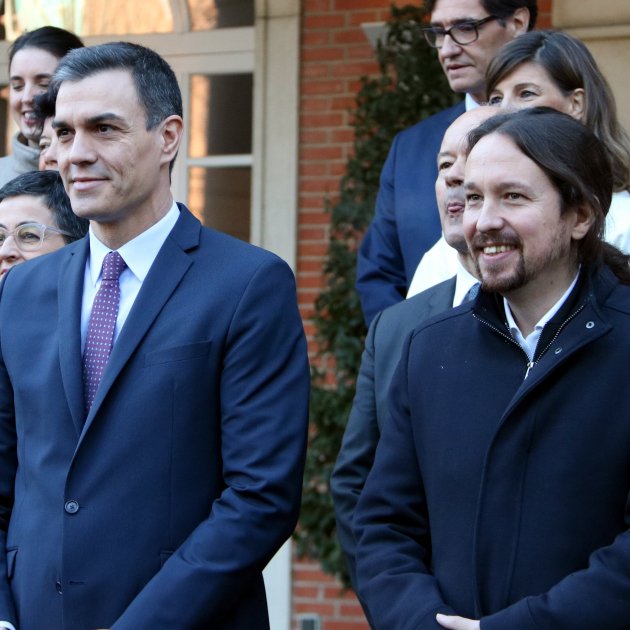Catalonia aside, if there is one issue on which Spanish PM Pedro Sánchez has gone round and round, promising first one thing and then the opposite, it is the issue of Spain's labour law. Specifically, the repeal of the labour law reform of 2012, which was pushed through by Mariano Rajoy as urgent liberalization in the midst of economic crisis, and seriously cut into workers' rights. Now, over the last 24 hours, all those swerves in the proposals to change this law have become evident, through the controversial agreement signed on Wednesday by governing parties the Socialists (PSOE) and Unidas Podemos on the one hand, and Basque pro-independence party EH Bildu on the other. The twists and turns of the last few months and years have been dialectical - with the differences between the two "progressive" coalition partners laid bare - but they are also visible in a paper trail which stretches all the way to last night's agreement.
In the Socialist policy programme for the first of the two Spanish general elections held last year, on April 28th, Sánchez promised only to eliminate "the most harmful aspects" of the 2012 labour reform. However, Sánchez failed to form a government after that vote, and in the campaign for the repeat election on November 10th, the plan was changed. At a meeting in Valencia in October 2019, he promised to repeal the entire 2012 law and pass a new labour statute.
After intense negotiations for the formation of the new government in December, this intention was reflected in the governing programme of the "progressive coalition" between the PSOE and its ally Unidas Podemos. Somewhere along the way, however, the "complete repeal" disappeared. The incoming coalition pledged, in general terms, to "repeal the labour reform" and "recover the labour rights which had been removed." In the category of “specific and urgent” changes, however, all that the coalition programme listed were the striking out of three aspects of the law: the removal of the possibility of dismissal of a worker due to absenteeism resulting from medical leave; the repeal of time limitations on collective agreements on labour conditions; and the repealing of measures that gave priority to labour agreements based on workplaces rather than whole sectors.
Fast forward four months to this week, and, in the context of the Spanish government's multiple negotiations to try and retain a majority for its coronavirus-crisis state of alarm, an agreement on the labour law reform was reached with EH Bildu. This much is clear. The document, signed by the spokespeople for the three parties, stated, firstly, that "the political forces that sign this agreement are committed to repealing in its entirety the 2012 labour reform promoted by the People's Party." Secondly, that the repeal would take effect "before the end of the extraordinary measures taken" in the context of the coronavirus crisis. The three-party pact, in exchange for the Basque party's abstention in the critical vote, was announced at nine o'clock on Wednesday night, at the end of the session of Congress which had, by then, already voted to extend the state of alarm. It was signed by all three parties. It marked a major twist in the script.
But the scriptwriters still had more up their sleeves: the tripartite agreement only lasted for a couple of hours. At around midnight, the PSOE sent a correction to journalists via WhatsApp. The first point was deleted and replaced with: “We will repeal the labour reform. We will recover the labour rights removed by the labour reform of 2012”. Now it read as a copy-paste of the coalition government agreement made in January, unchanged. In fact, the Spanish government told reporters last night it was still committed to repealing the possibility of dismissal for absenteeism due to medical leave - an article which has already been repealed.
These sudden changes of mind and policy have once again highlighted the contradictions within the coalition government itself. This Thursday, deputy PM and Podemos leader Pablo Iglesias told Catalunya Ràdio that the agreement signed with Bildu for the "complete" repeal of the labour reform must be complied with. "It's signed," said the Podemos leader simply. A few minutes later, on the Onda Cero airwaves, Socialist minister José Luis Ábalos contradicted him: "The PSOE position is given in the clarification." He argued that the agreement with the Basque party only affects the urgency with which the policy change will be carried out.
What has the coalition done in over 100 days?
The policy programme of the PSOE-Unidas Podemos “progressive coalition” undertook to repeal three aspects of the 2012 law on an “urgent” basis. It has been 129 days since the coalition government took power. To date, only one article of the PP's labour reform has been repealed: that which said that taking too much sick leave was grounds for dismissal. Labour minister Yolanda Díaz announced it with a great deal of fanfare. However, under the "corrected" agreement with Bildu, the progressive coalition is still promising to repeal it. Copy-paste problems.
